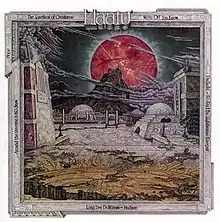| Hope | ||||
|---|---|---|---|---|
 | ||||
| Studio album by | ||||
| Released | September 12, 1977[1] | |||
| Recorded | June 1976 – June 1977[2] | |||
| Genre | ||||
| Length | 40:53 (including hidden track) | |||
| Label | Daffodil, Capitol | |||
| Producer | Terry Brown | |||
| Klaatu chronology | ||||
| ||||
| Review scores | |
|---|---|
| Source | Rating |
| Allmusic | (Klaatu/Hope two-in-one) |
| Classic Rock | |
Hope is the second album by the Canadian rock band Klaatu and their first concept album. Released in September 1977, it won a Juno Award for "Best Engineered Album" and a Canadian Music Critics award for "Best Album" that same year. The album follows the loose concept of space travelers visiting a distant planet.[6]
An alternate version of Hope was released in 2005 as part of the group's Sun Set collection of rarities. The alternate version on Sun Set includes the complete contributions of the London Symphony Orchestra, which had largely been removed from the version released in 1977. The alternate version also includes a short unreleased track, "Epilogue," which had originally been intended to be placed between "So Said the Lighthouse Keeper" and "Hope."[7]
Hope was remastered and re-issued in 2012 by the band's members, and was released on the band's independent record label Klaatunes.[7]
Musical style
A reviewer for Julian Cope's Head Heritage described Hope as “an elaborate sci-fi prog opera,[8] while an article in the Edmonton Journal described a “whimsical space-rock album”.[9] Allmusic's Mike DeGagne commented that the album was "less pop-infused" than the group's previous album 3:47 EST, and contained more "progressive depth" with an "experimental sound".[10] Peter Kurtz of the website felt that the album's conceptual rock opera theme sounded "pretentious, and in some cases like a rip-off of Queen".[3] Billboard described the songs as ranging from "fun light pop" similar to 10cc, to "theatrical melodramas" similar to Queen, and to well-orchestrated ballads similar to the Moody Blues.[6]
PopMatters described the song “Around the Universe in 80 Days” as a “powerful pop ballad” with a “gorgeous piano melody”, and a “fine example of effortless pop-rock craftsmanship”. It described “Prelude” as “an instrumental rock epic”.[11]
Artwork
Like the previous Klaatu album, the cover was painted by graphic artist Ted Jones.[12]
The cover shows "the Lighthouse Keeper's beam". The ruined stone plaza features the sun image from the cover of the previous Klaatu album.
Track listing
- Side one
| No. | Title | Writer(s) | Length |
|---|---|---|---|
| 1. | "We're Off You Know" | John Woloschuk | 4:01 |
| 2. | "Madman" | Dee Long | 2:39 |
| 3. | "Around the Universe in Eighty Days" | Long | 4:59 |
| 4. | "Long Live Politzania" | Woloschuk | 9:11 |
- Side two
| No. | Title | Writer(s) | Length |
|---|---|---|---|
| 1. | "The Loneliest of Creatures" | Woloschuk | 3:44 |
| 2. | "Prelude" | Woloschuk, Long, Terry Draper | 5:44 |
| 3. | "So Said the Lighthouse Keeper" | Woloschuk | 5:51 |
| 4. | "Hope" | Woloschuk | 4:44 |
| Total length: | 40:53 | ||
The album opens with a mouse squeak. Their previous album, 3:47 EST, ends with a mouse squeak. The cover art for each album features a mouse.
The original release credited all songs simply to "Klaatu"; however, subsequent reissues and the band's website provided individual song writing credits.[7]
Personnel
- Klaatu
- Dee Long - vocals, piano, electric guitar, acoustic guitar, organ, clavinet, bass guitar, synthesizer, mandolin, slide guitar, harmonica, electric sitar
- John Woloschuk - vocals, bass guitar, Fender Rhodes piano, autoharp, acoustic guitar, piano, organ, Polymoog synthesizer, harmonium, electric piano, pianet
- Terry Draper - drums, tambourine, triangle, percussion, whistle
- Additional
- Production
- Arranged & produced by Klaatu & Terry Brown
- Recorded & engineered by Terry Brown
The band members are not named on the original LP.[7]
References
- ↑ "Capitol Records Releasing 11 LPs on September 12th" (PDF). Klaatu.org. Retrieved 2020-09-04.
- ↑ "The Morning Sun - 5th Edition". Klaatu.org. Retrieved 2016-11-16.
- 1 2 Kurtz, Peter. "Hope - Klaatu". AllMusic. Retrieved 2018-10-30.
- ↑ Dave Sleger (1992-01-06). "Klaatu/Hope - Klaatu | Songs, Reviews, Credits". AllMusic. Retrieved 2016-11-16.
- ↑ "Klaatu: Hope album review". Loudersound. 10 August 2020.
- 1 2 "Billboard's Top Album Picks — Pop" (PDF). Billboard. United States. September 24, 1977. Retrieved March 3, 2022 – via World Radio History.
- 1 2 3 4 "The Official Klaatu Homepage". Klaatu.org. Retrieved 2016-11-16.
- ↑ Dog 3000. "Unsung Reviews – Klaatu: Sir Army Suit". Julian Cope Presents Head Heritage. Retrieved 7 September 2014.
{{cite web}}: CS1 maint: numeric names: authors list (link) - ↑ Hicks, Graham (12 July 1980). "Klaatu has long maintained a low profile emerging from the underground". Edmonton Journal.
- ↑ Mike DeGagne. "3:47 EST - Klaatu | Songs, Reviews, Credits". AllMusic. Retrieved 2016-11-16.
- ↑ "So Said the Lighthouse Keepers". www.popmatters.com.
- ↑ Bradley, David. "Klaatu Frequently Asked Questions". Klaatu.org. Retrieved 2021-01-16.
3:47 EST, Hope, Endangered Species and Magentalane were painted by longtime friend of the band, graphic artist Ted Jones.